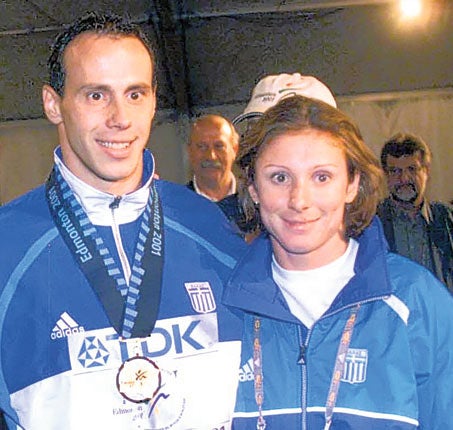Greek sprint pair 'lied' about bike accident

It has taken the best part of seven years – virtually the span of two Olympiads – but the law has finally caught up with Kostas Kenteris and Katerina Thanou. A court in Athens yesterday found the retired sprinters guilty of making false statements about an alleged motorcycle accident they had cited as the reason for missing drugs tests on the eve of the 2004 Olympics in the Greek capital. They could have been jailed for up to four years but received suspended sentences of 31 months.
Judge Dimitris Lefkos said: "The court finds that this accident never occurred." Christos Tzekos, who coached both athletes, was given a suspended sentence of 33 months and a fine of €5,000 (£4,400). Six doctors at the KAT Hospital, who treated Kenteris and Thanou after the alleged accident, and two witnesses were given suspended sentences of between six and eight months. All have an automatic right to appeal.
Judge Lefkos said the court found no mitigating circumstances. Kenteris's lawyer, Michalis Dimitrakopoulos, said: "It is simply unbelievable to refuse any mitigating circumstances to Olympic champions. That is granted to drug dealers and felons. And now we have this decision for two athletes as if they had not offered anything to the country. It is disgraceful and I am ashamed for my country." Kenteris and Thanou were not present for the verdict. Tzekos left without passing comment.
Kenteris, who emerged from obscurity to win the Olympic 200m title ahead of Britain's Darren Campbell in 2000, and Thanou, who took the women's 100m silver medal behind Marion Jones at those Sydney Games, were both suspended on the eve of their home Olympics after they went AWOL when an International Olympic Committee anti-doping team turned up to test them. They spent five days secluded in the KAT Hospital in Athens, claiming to have been victims of a motorbike accident.
It was the third drugs test the pair had missed in 17 days. On the day they left hospital police raided the premises of their coach and discovered 30 boxes of anabolic steroids and 1,400 boxes of supplements containing the banned stimulant ephedrine.
In 1997 Tzekos was suspended for two years by the International Association of Athletics Federations for employing what were described as "strong-arm tactics" to prevent four of his athletes from undergoing drug tests at an indoor meeting in Germany. In 2003 he was reprimanded by the world governing body for taking his sprinters to Qatar after notifying the Greek federation that, for the purposes of drug testing availability, they would be in Crete.
When Thanou won the European 100m title in Munich in 2002 the Belgian runner-up Kim Gevaert said: "I can't help thinking the gold medal should be mine. I don't think she is clean. She is always hiding."
Even though Marion Jones was retrospectively disqualified as winner of the 100m final in 2000 when she admitted she had been taking steroids at that time, the IOC have resisted promoting Thanou from silver medallist to gold medallist.
Join our commenting forum
Join thought-provoking conversations, follow other Independent readers and see their replies
Comments